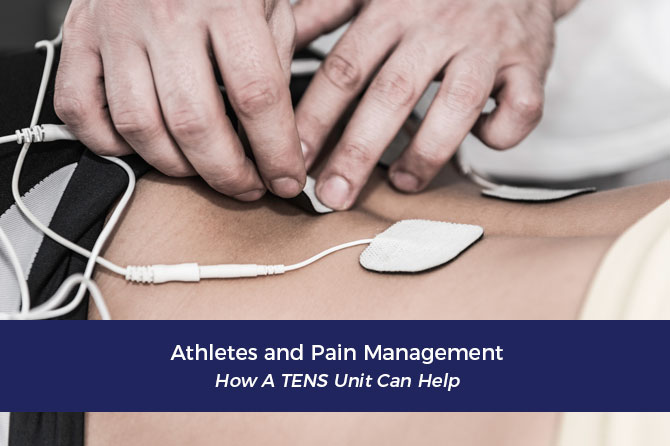
Athletes come in all shapes and sizes. From amateur to professional. What all athletes have in common when it comes to chronic pain is, “When can I return to my normal activity?”
The last thing an athlete wants to hear is that they have to stop doing what they love. And the path to resuming activity can take on many different modalities. One modality that is making a comeback for athletes who suffer from chronic pain is a TENS Unit.
What is a TENS Unit?
TENS stands for Transcutaneous Electrical Nerve Stimulation. These small battery powered devices use alternating current to stimulate very specific tissues in the body. How exactly these units affect the pain response is up for debate. And the efficacy of a TENS unit can be proven or disproven depending on which medical study you read.
What a TENS unit does provide for most athletes is temporary relief from pain. After an athlete learns how to use the TENS unit in a clinical setting, they can then self-administer the modality without any risk of further injury. The athlete has control over their course of pain management which can be empowering as well as promote the placebo effect of these devices.
Devices range in price from $100-$300. Some insurance covers these medical devices while others do not. A TENS unit does not treat all kinds of pain. There is less evidence that a TENS unit will work on acute pain and more evidence that they work with a greater population to relieve chronic pain.
How Does A TENS Unit Work?
A TENS unit sends alternating electrical current to electrodes that adhere to the skin. It is thought that the electrical stimulation activates the descending pain-inhibitory pathway. fMRI studies in patients suggest that this is the key brain activity that affects the decrease in pain sensation.
It is also thought that the electronic stimulation drowns out the pain. Or simply distracts the brain from sensing the pain. There are other bodies of evidence that suggests that a TENS unit can actually heal damaged tissue. The electrical activity can actually change the tissue behavior.
The patient then has complete control over the administration of the device. From duration, electrical frequency, to intensity. The athlete has complete control and may adjust the unit according to their preferences.
Aside from the direct effect of the electrical stimulation on the nerves and surrounding tissue, there is also a secondary hormonal effect of a TENS unit. The electrical stimulation can trigger the release of endorphins and encephalin in the body. Allowing the athlete to feel that familiar “runner’s high.” While the release of these hormones may be artificially induced, they provide a natural mechanism to heal the body.
What To Consider When Using A TENS Unit?
Medical professionals have been prescribing TENS units for years. There is no risk of overuse or addiction as there are in pills – especially narcotics. After clinical use, a TENS unit is easy for a patient to administer on his/her own. The athlete has complete control over the course of chronic pain relief treatment.
While there remains the debate as to whether a TENS Unit merely has a placebo effect, the risk of further injury or secondary complications (addictions) is almost zero.
A TENS unit is a great way to supplement physical therapy and help athletes get back to activity. Chronic pain can be very difficult for an athlete. Not being able to do what they love can be painful in its own way. A TENS unit puts the athlete back in the driver’s seat so they can help self-manage their chronic pain therapy.
Your certified pain management specialist is here to help. We are experts in all kinds of chronic pain modalities. Let’s see if a TENS unit will work for you. Give us a call at 909 887 2991 to set an appointment. Let us relieve the pressure and relieve your pain. So you may get back to being an athlete.
Leave a reply








I suffered from what they called peripheral artery disease (PAD). I have been suffering for years, Me and my wife searched for a medical cure, and then we came across a testimony of a man who suffered the same and was cured by Dr Chief Lucky. So my wife and I contacted Dr Chief Lucky via an email and thank God he replied. I explained what was wrong and he sent me herbal medicines that helped heal me completely. I am happy to say that herbal medicine is the ultimate and Dr Chief Lucky I am grateful. You can contact him on his email: chiefdrlucky@gmail.com or whatsapp: +2348132777335, Dr Chief Lucky said that he also specializes in the following diseases: LUPUS, ALS, CANCER, HPV, HERPES, DIABETES, COPD, HEPATITIS B, HIV AIDS, And more.
Reply